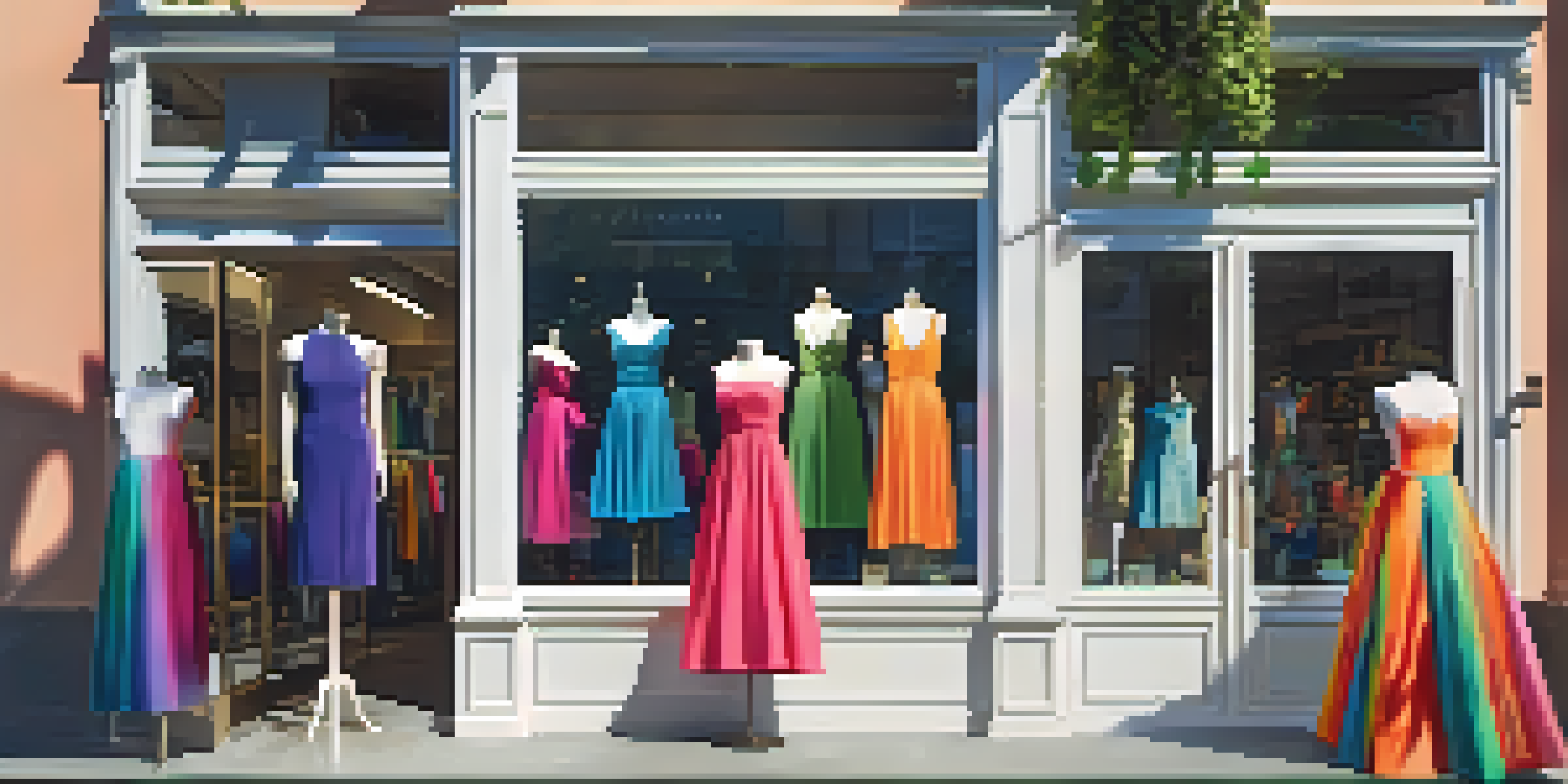The Future of Fashion: Rental Services and Eco-Consciousness

Understanding the Rise of Fashion Rental Services
In recent years, fashion rental services have surged in popularity, allowing consumers to access high-end clothing without the hefty price tag. This shift has been driven by a desire for flexibility, as people seek to refresh their wardrobes without the commitment of ownership. Renting provides an opportunity to wear designer pieces for special occasions, making luxury fashion more accessible than ever.
Fashion is about dressing according to what's fashionable. Style is more about being yourself.
With platforms like Rent the Runway and HURR Collective gaining traction, the concept of renting rather than buying is becoming mainstream. This trend appeals particularly to millennials and Gen Z, who prioritize experiences over possessions. The convenience of online rentals, combined with the excitement of wearing something new, makes this model particularly attractive.
As rental services continue to grow, they are challenging traditional retail norms. By offering an alternative to fast fashion, these services encourage consumers to think critically about their clothing choices and the impact on the environment. This paradigm shift not only caters to evolving consumer preferences but also reflects a broader cultural movement towards sustainability.
Eco-Consciousness: A Driving Force in Fashion
Eco-consciousness has become a pivotal theme in the fashion industry, influencing both consumer behavior and brand strategies. As awareness of environmental issues rises, more shoppers are seeking sustainable options, including rental services that promote circular fashion. This shift signifies a growing understanding that the choices we make today affect our planet tomorrow.

For many, making eco-friendly choices means opting for brands that prioritize sustainability in their practices. Fashion rental services align perfectly with this ethos, as they extend the life of garments and minimize waste. By sharing clothing rather than owning it, consumers can significantly reduce their ecological footprint.
Fashion Rental Services Gain Popularity
The rise of fashion rental services offers consumers access to high-end clothing, catering to a growing preference for flexibility and sustainability.
Moreover, the rise of eco-consciousness has sparked innovation within the fashion industry. Brands are rethinking materials, production processes, and distribution methods to lessen their environmental impact. This commitment to sustainability is not just a trend; it’s becoming a fundamental expectation among consumers.
The Benefits of Renting vs. Buying
Renting clothing comes with numerous benefits that extend beyond simply saving money. First and foremost, it allows individuals to experiment with diverse styles without the long-term commitment of purchasing. This can be especially beneficial for those who enjoy trying out new looks or need outfits for specific occasions.
The future of fashion is not about what you wear, but about how it’s made.
Additionally, renting reduces the clutter in our closets, promoting a more minimalist lifestyle. Rather than accumulating items that may only be worn once or twice, consumers can choose to rent trendy pieces that they might not wear frequently. This not only simplifies wardrobe management but also encourages a more thoughtful approach to fashion consumption.
Lastly, the environmental benefits of renting cannot be overlooked. By choosing rental services, consumers contribute to reducing waste and the demand for fast fashion. This shift towards a more sustainable model of fashion consumption is a significant step in the right direction for both the industry and the planet.
Challenges Facing Fashion Rental Services
Despite their growing popularity, fashion rental services face several challenges that could impact their future. One of the primary concerns is the logistics of managing inventory, including cleaning, repairing, and maintaining garments. This can create operational hurdles that may deter some businesses from entering the rental market.
Another challenge is consumer perception—some individuals may view renting as less prestigious than owning designer items. Changing this mindset requires strategic marketing that highlights the benefits of renting, such as sustainability and cost-effectiveness. Building trust and credibility is essential for rental services to thrive in a competitive market.
Eco-Consciousness Drives Consumer Choices
Increasing awareness of environmental issues is leading shoppers to seek sustainable options like clothing rentals that promote circular fashion.
Lastly, the ongoing evolution of consumer preferences adds an additional layer of complexity. As trends shift rapidly, rental services must adapt quickly to meet changing demands. This requires a keen understanding of fashion cycles and a proactive approach to curating collections that resonate with consumers.
The Role of Technology in Fashion Rentals
Technology plays an integral role in the success of fashion rental services, enhancing the overall customer experience. From user-friendly websites to mobile apps, tech innovations simplify the process of browsing, selecting, and renting clothing. These platforms often feature advanced algorithms that recommend items based on individual preferences, making shopping more personalized and efficient.
Moreover, technology can streamline logistics, allowing rental companies to manage inventory effectively. Automated systems can track garment availability, rental history, and return logistics, reducing the potential for errors and improving operational efficiency. This not only benefits the businesses but also enhances the overall rental experience for customers.
Lastly, technology facilitates community engagement through social media and online platforms. By sharing user-generated content and reviews, rental services can foster a sense of community among renters. This interaction helps build brand loyalty and encourages new customers to embrace the concept of renting as a sustainable fashion choice.
A Look at Sustainable Fashion Brands
Sustainable fashion brands are leading the charge in promoting eco-conscious practices within the industry. Many of these brands prioritize ethical production methods, using organic materials and fair labor practices. By supporting these companies, consumers can make a significant impact on the fashion landscape while enjoying stylish and responsibly made clothing.
Brands like Reformation and Eileen Fisher have set examples by integrating sustainability into their business models. They not only offer rental options but also emphasize transparency in their supply chains. This commitment to sustainability resonates with consumers who are increasingly seeking brands that align with their values.
Technology Enhances Rental Experience
Innovations in technology streamline the rental process and improve customer engagement, making renting clothing more accessible and enjoyable.
As more sustainable fashion brands emerge, the rental market is poised to expand further. Collaborations between rental services and eco-friendly brands can create exciting opportunities for consumers. This synergy can enhance the appeal of renting while promoting a more sustainable approach to fashion consumption.
The Future of Fashion: A Sustainable Collaboration
Looking ahead, the future of fashion seems to be rooted in collaboration between rental services and sustainable brands. By working together, these entities can redefine the fashion landscape, making eco-conscious choices more accessible to everyone. This partnership can promote transparency, responsible sourcing, and a circular economy, where clothing is valued and reused.
As the fashion industry continues to evolve, we can expect to see innovative solutions that prioritize both style and sustainability. The integration of technology and eco-friendly practices will shape a new paradigm in which consumers can enjoy fashion without compromising their values. This shift could signify a brighter future for both the industry and the planet.

Ultimately, embracing rental services and sustainable practices can lead to a more responsible approach to fashion. As consumers become more conscious of their choices, they will drive demand for more ethical options. This collective movement towards sustainability will not only transform the fashion industry but also contribute to a healthier planet for future generations.